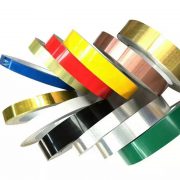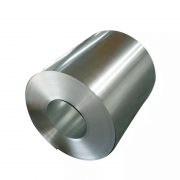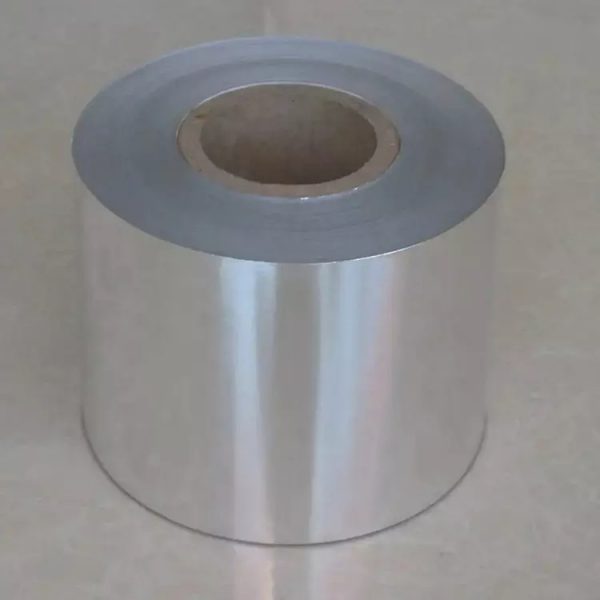
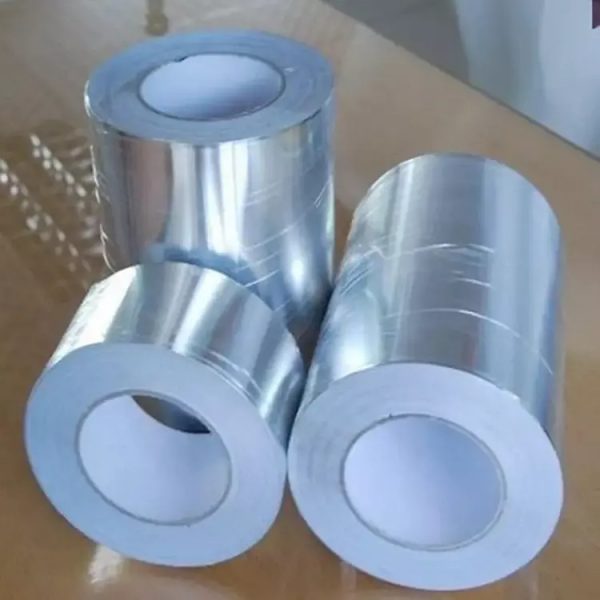
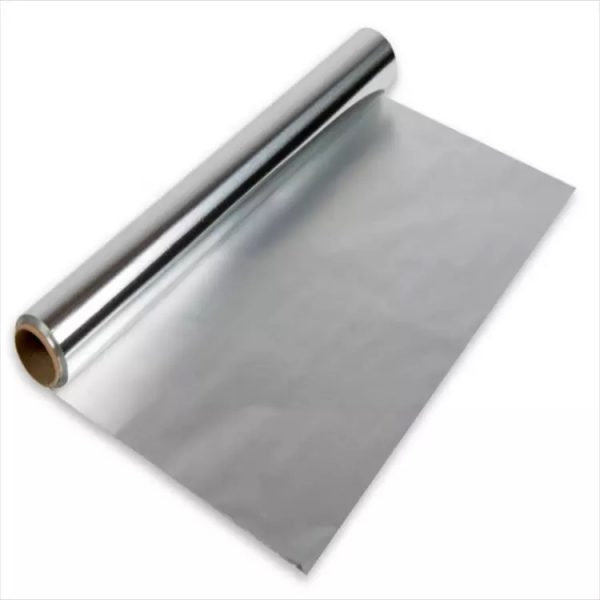
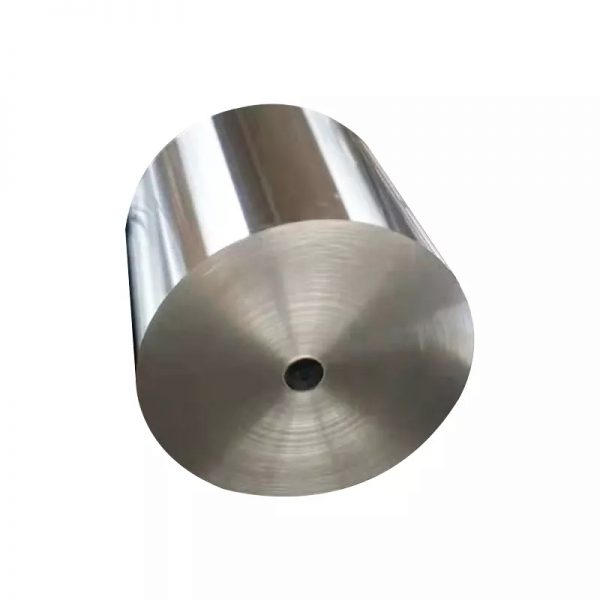
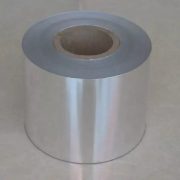
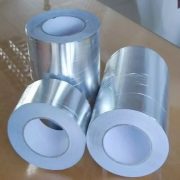
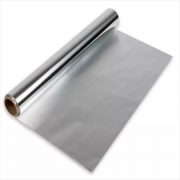
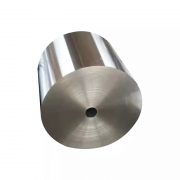
Aluminium foil
Aluminium foil is aluminium prepared in thin metal leaves with a thickness of less than 0.2mm (7.9 mils); thinner gauges down to 4 micrometers are also commonly used. Standard household foil is typically 0.016 mm (0.63 mils) thick, and heavy-duty household foil is typically 0.024 mm (0.94 mils). And the air conditioner foil can be thinner than 0.0047mm, and some food foil thinner than 0.002mm. The foil is pliable and can be readily bent or wrapped around objects. Thin foils are fragile and are sometimes laminated with other materials such as plastics or paper to make them stronger and more useful. It’s used industrially for a variety of purposes, including packing, insulation and transportation. At home, people use aluminum foil for food storage, to cover baking surfaces and to wrap foods, such as meats, to prevent them from losing moisture while cooking.
- Description
- Inquiry
Aluminium foil is aluminium prepared in thin metal leaves with a thickness of less than 0.2mm (7.9 mils); thinner gauges down to 4 micrometers are also commonly used. Standard household foil is typically 0.016 mm (0.63 mils) thick, and heavy-duty household foil is typically 0.024 mm (0.94 mils). And the air conditioner foil can be thinner than 0.0047mm, and some food foil thinner than 0.002mm. The foil is pliable and can be readily bent or wrapped around objects. Thin foils are fragile and are sometimes laminated with other materials such as plastics or paper to make them stronger and more useful. It’s used industrially for a variety of purposes, including packing, insulation and transportation. At home, people use aluminum foil for food storage, to cover baking surfaces and to wrap foods, such as meats, to prevent them from losing moisture while cooking.
Regardless of your demand, Grand will provide specific high-quality aluminium foil products that suit your needs. Whether it is aesthetic changes or excellent mechanical properties, we will provide you with precise aluminium foil! Contact us now to learn more about our aluminium foil.
Product Details
| Product Name | Aluminium foil | ||
| Alloy/Grade | 1050, 1060, 1070, 1100, 1200, 2024, 3003, 3104, 3105, 3005, 5052, 5754, 5083, 5251, 6061, 6063, 6082, 7075, 8011 8079, 8021 | ||
| Temper | F, O, H, T | MOQ | 5T for customized, 2T for stock |
| Thickness | 0.014mm-0.2mm | Packaging | Wooden Pallet for Strip & Coil |
| Width | 60mm-1600mm | Delivery | 15-25days for production |
| Length | Coiled | ID | 76/89/152/300/405/508/790/800mm, etc. |
| Type | Strip, Coil | Origin | China |
| Standard | GB/ASTM ENAW | Loading Port | Any port of China, Shanghai & Ningbo & Qingdao |
| Surface | Mill Finish | Delivery Methods | 1. By sea: Any port in China2. By train: Chongqing(Yiwu) International Railway to Middle Asia-Europe |
| Certificates | ISO, SGS | ||
Parameters
| Property | Value/Comment |
| Specific gravity | 2.7 |
| Weight | At 6.35 µm foil weighs 17.2 g/m2 |
| Melting point | 660°C |
| Electrical conductivity | 37.67 m/mm2d (64.94% IACS) |
| Electrical resistivity | 2.65 µΩ.cm |
| Thermal conductivity | 235 W/m.K |
| Thickness | Foil is defined as metal measuring 0.2mm (or 200 µm and below) |
How Is Aluminium Foil Made?
Aluminum foil is produced by rolling sheet ingots cast from molten billet aluminium, then re-rolling on sheet and foil rolling mills to the desired thickness, or by continuously casting and cold rolling. To maintain a constant thickness in aluminium foil production, beta radiation is passed through the foil to a sensor on the other side. If the intensity becomes too high, then the rollers adjust, increasing the thickness. If the intensities become too low and the foil has become too thick, the rollers apply more pressure, causing the foil to be made thinner. The rolls of aluminum foil are then slit on slitter rewinding machines into smaller rolls. Roll slitting and rewinding is an essential part of the finishing process.
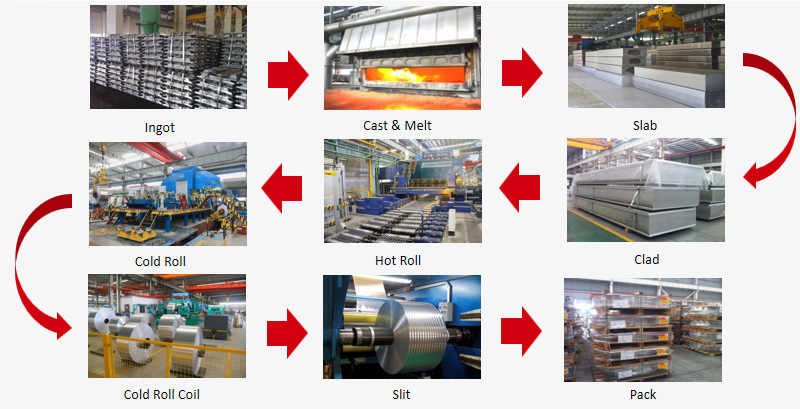
Classification of Aluminium Foil
Aluminium foil classified by thickness:
- T<001 – light gauge foil (also called double zero foil)
- 1≤ T ≥0.001– medium gauge foil (also called single zero foil)
- T ≥0.1mm– heavy gauge foil
Aluminium foil classified by composite material:
- Flux clad aluminium foil
- Zinc coated aluminium foil
- Bare aluminium foil
Aluminium foil classified by alloy grade:
- 1xxx series: 1050, 1060, 1070, 1100, 1200,1350
- 2xxx series: 2011, 2024
- 3xxx series: 3003, 3104, 3105, 3005
- 5xxx series: 5052, 5754, 5083, 5251
- 6xxx series: 6061
- 8xxx series: 8006, 8011, 8021, 8079
Aluminium foil classified by application:
| ● Aluminium Foil Coil For Fin Material ● Aluminium Clad Foil For Heat Transfer ● Aluminium Foil For Clad Tube Material ● Air-conditioner Foil ● Battery Aluminium Foil ● Tape Aluminium Foil ● Cable Aluminium Foil ● Pharmacy Aluminium Foil |
● Electronic Tag Aluminium Foil ● Honeycomb Aluminium Foil ● Household Aluminium Foil ● Electronic Aluminium Foil ● Packaging Aluminium Foil ● Container Aluminium Foil ● Hydrophilic Aluminium Foil ● Food Aluminium Foil |
How To Choose Aluminium Grade?
When we choose aluminium, it is important to note that choosing the right alloy is directly dependent on the properties and the specific using scenario. Before you purchase aluminium grade, it is vital to pay attention to flowing properties:
- Tensile Strength
- Thermal Conductivity
- Weldability
- Formability
- Corrosion Resistance
Applications of Aluminium Foil
Aluminum foil can be used for a wide range of applications:
- Automobile application
- Heat transfer (fin material, weld tube material)
- Packaging
- Packaging
- Insulation
- Electromagnetic shielding
- Cooking
- Art and decoration
- Geochemical sampling
- Ribbon microphones
Advantages of Aluminium Foil
- Aluminium foil has a shiny metallic luster, decorative.
- Non-toxic, tasteless, odorless.
- Relatively lightweight, the proportion is only one-third of iron, copper.
- Full-extension, thin, low weight per unit area.
- Blackout good, reflective rate of 95%.
- Protection and strong, so the package less susceptible to bacteria, fungi and insects infringement.
- High and low-temperature stability, temperature -73 ~ 371 ℃ without deformation sizing.
Why Use Aluminium Foil?
Aluminium foil is prepared in thin sheets and used in a wide range of applications, from everyday household foil to heavy-duty, heat-resistant industrial foil rolls. Aluminium foil is extremely pliable and can be bent or wrapped around objects with ease. Typical finishes are available in pack rolled (one side bright/one side matte), two sides polished and mill finish. Millions of tons of aluminium foil are used throughout the world to protect and package foods, cosmetics and chemical products. Aluminum is a durable and easily used material, making it an ideal option for several industrial applications.
How Do I Know Which Aluminium Foil To Use?
Standard Aluminium Foil – Great for wrapping lighter individual items and covering containers for storage. Our aluminium foil is 0.0005 – 0.0007 thick.
Heavy Duty Aluminium Foil – Is used in cooking situations for lining pans and cooking sheets. Great for moderate heat. The CHAL heavy duty foil is 0.0009 thick.
Extra Heavy Duty Aluminium Foil – Ideal for high heat situations and heavy wrapping situations. Great for lining grills and coming in direct contact with flames. To be used for wrapping heavy meats such as briskets and slabs of ribs. The CHAL extra heavy duty foil is 0.0013 thick.
Is It Safe to Use Aluminium Foil?
Aluminum is one of the most abundant metals on earth. It’s naturally occurring in most foods, including fruits, vegetables, meats, fish, grains and dairy products. Besides, some of the aluminium you eat comes from processed food additives, such as preservatives, coloring agents, anti-caking agents and thickeners.
Regardless, the aluminum content of food and medication isn’t considered a problem, as only a tiny amount of the aluminum you ingest is absorbed. The rest is passed in your urine feces. Furthermore, in healthy people, absorbed aluminum is later excreted in your urine.
So, the small amount of aluminium you ingest daily is considered safe.
Equipments For Making Aluminium Foil
3300mm + 2800mm “1+1” hot mill
- MINO auto control system imported from Italy, with high machining accuracy (thickness tolerance±0.2mm).
- High rolling force on 3300 rough hot rollings, to realize the rotated rolling with the excellent control of thickness and flatness.
- The auto control system enables the precise machining on 2800 finishing rolling.
- Able to operate separately to improve efficiency and reduce cost.
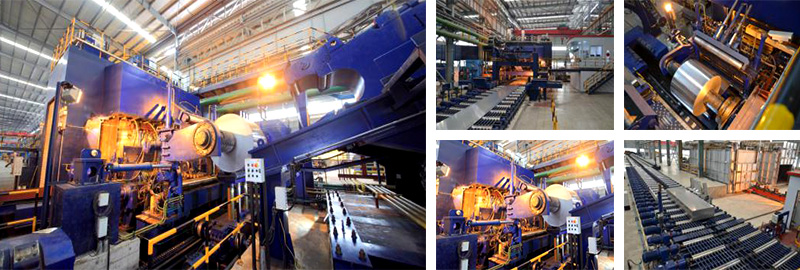
2800mm Cold Roll Machine
- The oil cold rolling mill of aluminium alloy plate and strip which designed and refitted by Italy Mino, has abilities of large rolling force, wide width cold rolling, plate finishing and roughening rolling.
- By adopting the latest technology coupled with computer simulation and finite element method, the maximum rolling force can reach 3000 tons and the maximum rolling width can reach 2600mm.
- It is the only one ultra-wide all-in-one plate and coil machine in domestic can compare with SWA’s 1600mm mill and Alcoa’s 2600mm mill.
Cold Roll Mill
- From ACHENBACH. Electrical drive, AGC and AFC system integration from MINO Italy. Supporting with gauge tester and BETA laser velocimeter well control the accuracy, to ensure the thickness tolerance and flatness requirements.
- Disc scissor frame and blade imported from Germany, to guarantee the shearing precision, which can well meet the requirements of width tolerance and edge burr rate.
- The nitrogen protected annealing furnace imported by a Germany junker company, which can guarantee the surface quality.
Our Advantages
- Pure primary ingot.
- Accurate dimensions and tolerance.
- High-quality surface. The surface is free from defects, oil stain, wave, scratches, roll mark.
- High flatness.
- Tension-leveling, oil-washing.
- With decades of production experience.

Related Products
-
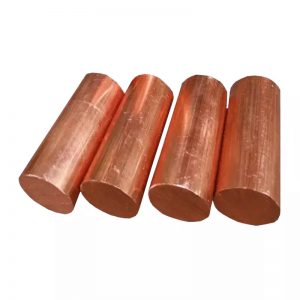
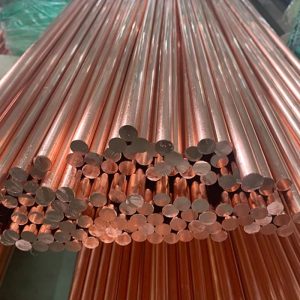 Read MoreQuick View
Read MoreQuick ViewCopper Rod
Copper bar is a kind of non-ferrous metal processing bar, which has better processing performance and high conductivity. It is mainly divided into brass rod (copper zinc alloy, cheaper), purple copper rod (higher copper content).
Brass rod is a rod shaped object made of copper and zinc alloy, named for its yellow color. The melting point of brass, which contains 56% to 68% copper, is 934 to 967 degrees. Brass has good mechanical properties and wear resistance, and can be used to manufacture precision instruments, ship parts, gun casings and so on. Used in air conditioning pipe, refrigerator pipe, oil pipe, water supply pipe and all kinds of mechanical materials, automotive synchronizer gear ring, Marine pump, valve, structural parts, friction accessories, etc.
Purple copper rod is named for its purple red color. It has good electric conductivity, heat conduction, corrosion resistance and processing properties. It can be welded and brazed. Characteristics: high purity, fine structure, low oxygen content. No porosity, trachoma, loose, excellent electrical conductivity, high precision of electroetching mold surface, after heat treatment process, no direction of the electrode, suitable for fine play, fine play, with good thermoelectric channel, processability, ductility, corrosion resistance and weather resistance.
-
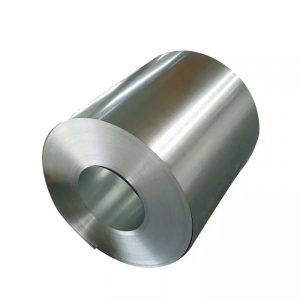
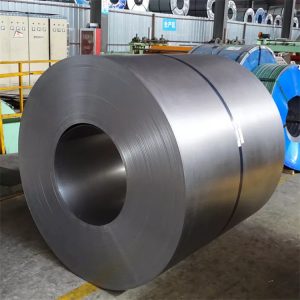 Read MoreQuick View
Read MoreQuick ViewAluminium Coil
Aluminium coil is a rolled product, produced in a coiled form of a continuous strip, and has an inner diameter and outer diameter. ID from50mm to 1000mm. Aluminium alloy grade including 1xxx, 2xxx, 3xxx, 4xxx, 5xxx, 6xxx, 7xxx, 8xxx. But the most common is 1050, 3003, 6061 and 5251 aluminum coil. Thickness from 0.045-80mm, width from 60-2650mm. Common widths of aluminum coil is 800mm,1000mm, 1250mm,1450mm and 1500mm.
Multiple industries rely on aluminium coils for a variety of applications, such as automotive, construction, heat transfer, pharmaceutical, electrical, and food industry. Compared to other materials, aluminum is a far superior material in many instances. Aluminum coil can be supplied with standard mill finish, or it can be brushed, checkered, color coated, satin-finished and anodized. Aluminium sheet or aluminium foil can be cut into coils as per client’s requirements.
-
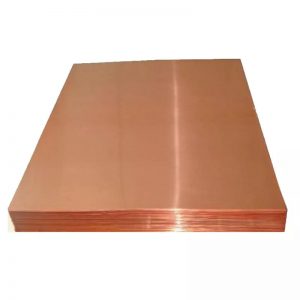
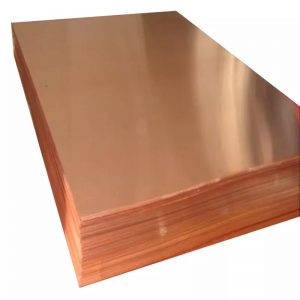 Read MoreQuick View
Read MoreQuick ViewCopper Sheet
Copper sheet is a very workable and malleable form of metal, high in electrical and thermal conductivity, and provides excellent corrosion resistance. A beautiful and versatile metal, copper has been utilized for thousands of years. Historically, it served as a favorite choice in making tools, vessels, and sculptures. Copper is also known for its beautiful patinas. When exposed, unsealed, to an outdoor environment, copper begins to oxidize. This exposure creates beautiful color variations in the form of a patina. The coloring of the patina will change and develop character over time while serving to protect the metal from deterioration. People will also create a patina quickly with the use of chemical mixtures that speed the process up and allow a patina to develop without outdoor exposure. Copper sheets can also be hammered, tooled, or embossed for added texture and decorative or functional appeal and come in many thicknesses from very thin copper foil to thick copper plate. It also comes in many alloys that blend other metals with copper. At Grand Copper, we sell pure copper -C110 (other alloys and tempers available upon request). This high purity provides the premium quality needed for projects and applications in a wide range of industries and uses. We take pride in providing the best material. Our high-quality, affordable material and friendly, first-rate customer service have made us a leader in the industry for over a decade.
-
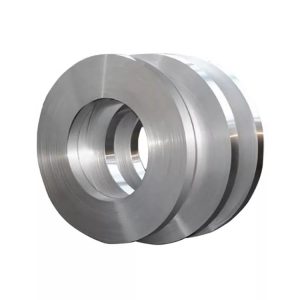
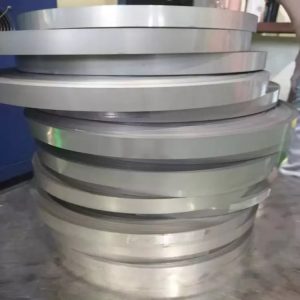 Read MoreQuick View
Read MoreQuick ViewTitanium Strip
Titanium strip is produced from the titanium sheet. Usually cold-rolled the titanium sheet by a small mill with annealing for several times, then slitting shear to titanium strips according to customer requirements. The advanced equipment, rolling process, process control, annealing temperature and return time control ensured its smoothness and finish, effectively improved the quality of our products.
-
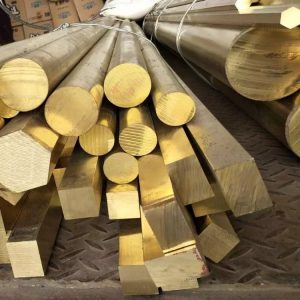
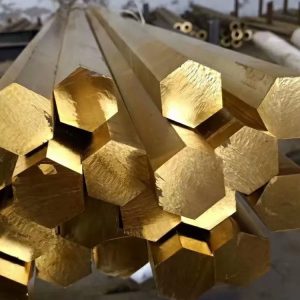 Read MoreQuick View
Read MoreQuick ViewBrass Bar
-
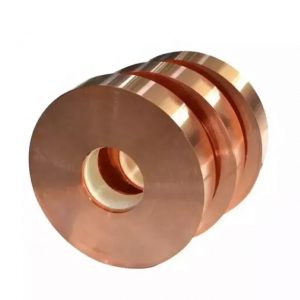
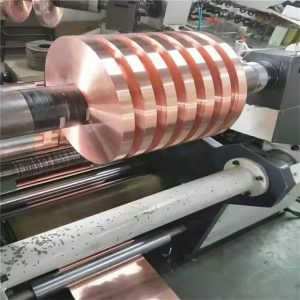 Read MoreQuick View
Read MoreQuick ViewCopper Strips
Copper strips have high electrical and thermal conductivity, that’s why copper strips are the best for transformer winding.
What’s more, copper strips transfer heat more effectively than other metals strips.
Copper strips are more malleable and have high tensile strength. Corrosion resistance, high degree stability, and heat dissipation of copper strips are superior to other metals.
Copper strips are mostly used in the electrical and electronics sectors because copper is non-magnetic and non-sparking. Copper strips are mostly used in heat exchangers, transformers winding, condensers, and lightning conductors.
Copper strip thickness range from 0.03mm to 3.0mm. Copper strips can be manufactured in different widths and thicknesses per the customer’s requirement.
If any questions, please feel free to contact sales@grandsteeltube.com
-
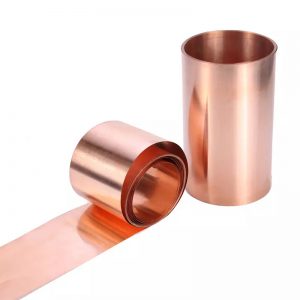
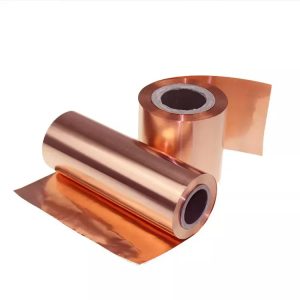 Read MoreQuick View
Read MoreQuick ViewCopper Foil
Copper is a reddish brown metallic element with outstanding characteristics such as good ductility, ductility, heat and conductivity
Pure copper is a very soft and ductile metal To achieve the required performance, we can alloy with other metals Brass and bronze are widely used copper alloys
Copper foil is made of copper or copper alloy by hot rolling and cold rolling The thickness of copper foil ranges from 0.03mm to 0.2mm, and the width and length can be customized according to customer requirements
-
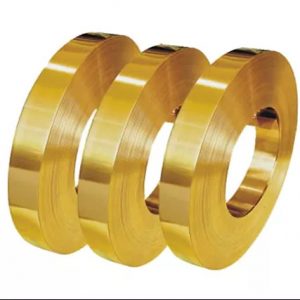
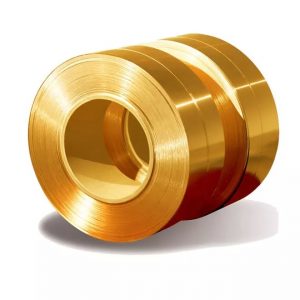 Read MoreQuick View
Read MoreQuick ViewBrass Strips
Brass Strip has higher strength than copper, good electrical and thermal conductivity, high corrosion resistance in the atmosphere and freshwater, and good plasticity, easy to cold and hot pressure processing, easy welding, forging and tin plating, no stress corrosion cracking.
-
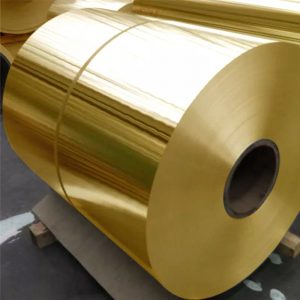
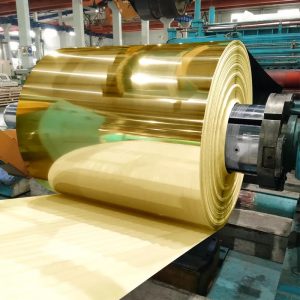 Read MoreQuick View
Read MoreQuick ViewBrass Coil
Brass coil has excellent plasticity (best in brass) and high strength, good machinability, easy to weld, very stable to general corrosion, but prone to corrosion cracking; brass coil is copper and the alloy of zinc is named for its yellow color.
The mechanical properties and wear resistance of the brass coil are very good, and can be used to manufacture precision instruments, ship parts, shells of guns, etc. Brass knocks up and sounds good, so instruments such as cymbals, cymbals, bells, and numbers are made of brass. According to the chemical composition, brass is divided into ordinary copper and special brass.
-
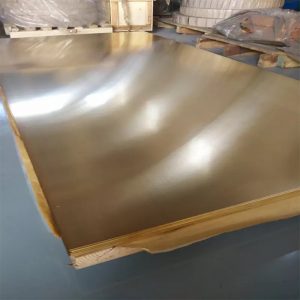
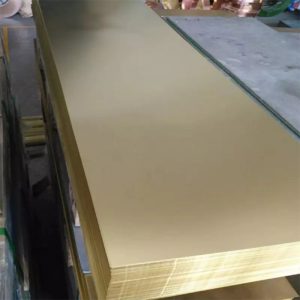 Read MoreQuick View
Read MoreQuick ViewBrass Sheet
Brass Sheet based on electrolytic copper, zinc and trace elements as its raw material, through processing by ingot, hot rolling, cold rolling, heat treatment, surface cleaning, cutting, finishing, and then packing. Material processes performance, plasticity, mechanical properties, corrosion resistance, performance and good tin.
It has been widely used in electrical, automotive, communications, hardware, decoration and other industries.
- DIN2391 Precision Steel Tube
- EN10305-1/4 Precision Steel Tube
- EN10305-2/3/5/6 Precision Tubes
- SAE Series Precision Tubes
- ISO8535-1 Fuel Injection Tube
- Single/Doulbe Wall Bundy Tube
- Boiler & Pressure Steel Tubes
- Seamless Honed/SRB Steel Tube
- Stainless Capillary Steel Tubes
- Seamless Stainless Tubes & Pipes
- Welded Stainless Tubes & Pipes
- Injection & Control Line Tubes
- Nickel Alloy Tubes & Pipes
- Non-ferrous Capillary Tubes
- Aluminium Tubes & Pipes
- Brass Tubes & Pipes
- Copper Tubes & Pipes
- Titanium Tubes & Pipes
- Extruded/Welded Fin Tube
- Non-Ferrous Precision Tube
- Special Shaped Steel Tubes
- Metallic Coil/Foil/Sheet/Strip

